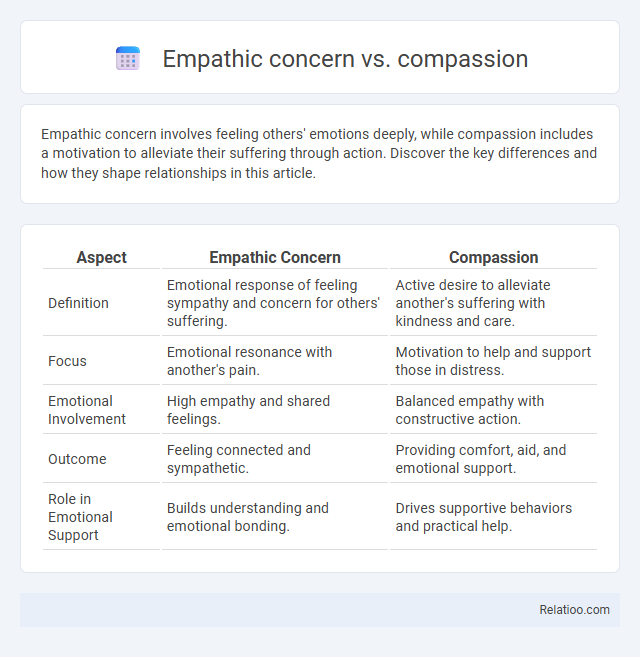Empathic concern involves feeling others' emotions deeply, while compassion includes a motivation to alleviate their suffering through action. Discover the key differences and how they shape relationships in this article.
Table of Comparison
| Aspect | Empathic Concern | Compassion |
|---|---|---|
| Definition | Emotional response of feeling sympathy and concern for others' suffering. | Active desire to alleviate another's suffering with kindness and care. |
| Focus | Emotional resonance with another's pain. | Motivation to help and support those in distress. |
| Emotional Involvement | High empathy and shared feelings. | Balanced empathy with constructive action. |
| Outcome | Feeling connected and sympathetic. | Providing comfort, aid, and emotional support. |
| Role in Emotional Support | Builds understanding and emotional bonding. | Drives supportive behaviors and practical help. |
Understanding Empathic Concern
Empathic concern involves an emotional response characterized by feelings of warmth, tenderness, and care toward others experiencing distress, distinguishing it from general empathy which primarily entails understanding others' emotions. Compassion extends beyond empathic concern by incorporating a motivational component to alleviate suffering through supportive actions. Understanding empathic concern highlights its role as a foundational affective process that drives prosocial behaviors and promotes social bonding.
Defining Compassion
Compassion is defined as the emotional response of caring for another person's suffering combined with a desire to alleviate it, distinguishing it from empathic concern, which primarily involves feelings of warmth and concern without the active motivation to help. Empathic concern reflects an affective empathy that prompts feelings of sympathy, whereas compassion extends this feeling into benevolent action. Understanding compassion involves recognizing its role in promoting prosocial behavior and enhancing psychological well-being through intentional support and care.
Key Differences Between Empathic Concern and Compassion
Empathic concern involves an other-focused emotional response characterized by feelings of sympathy and a desire to help, whereas compassion extends this by incorporating motivation to alleviate suffering through proactive actions. Unlike empathic concern, which emphasizes emotional resonance and care for another's distress, compassion includes a deeper commitment to engage and support the person in need effectively. The key difference lies in compassion's actionable intent and sustained commitment, beyond the immediate emotional response seen in empathic concern.
Psychological Roots of Empathic Concern
Empathic concern arises from affective empathy and involves an emotional response characterized by feelings of warmth, tenderness, and compassion toward others' suffering, rooted in neurobiological circuits linked to caregiving behaviors. Compassion extends empathic concern by incorporating a motivational component to alleviate another's distress, engaging brain regions associated with reward and caregiving, such as the anterior insula and medial prefrontal cortex. The psychological roots of empathic concern trace back to early attachment experiences and socialization processes that foster prosocial motivations and emotional resonance, distinguishing it from purely cognitive empathy or generalized sympathy.
The Science Behind Compassion
Empathic concern and compassion both involve recognizing and responding to others' emotions, but empathic concern specifically refers to feeling others' distress, prompting an emotional response without necessarily leading to action. Compassion extends beyond empathic concern by including a motivational component to alleviate suffering and improve well-being. Understanding the science behind compassion reveals how this prosocial emotion activates brain regions linked to caregiving, emotional regulation, and reward, highlighting its vital role in your social connections and psychological health.
Empathic Concern in Everyday Life
Empathic concern involves feeling genuine care and concern for others' well-being, driving prosocial behavior and emotional support in daily interactions. Unlike compassion, which includes an active desire to alleviate suffering, empathic concern focuses on understanding and sharing feelings without necessarily taking action. Your ability to cultivate empathic concern enhances social bonds, promotes emotional resilience, and fosters a supportive environment in everyday life.
Compassion’s Role in Social Connections
Compassion plays a vital role in strengthening social connections by motivating prosocial behavior and fostering emotional bonds between individuals. Unlike empathic concern, which involves feeling others' emotions, compassion actively drives you to alleviate their suffering through supportive actions. This dynamic engagement enhances trust, cooperation, and overall social cohesion within communities.
Impacts on Mental Health: Empathic Concern vs Compassion
Empathic concern involves feeling deep care and sorrow for another's suffering, which can sometimes lead to emotional overwhelm and increased stress or anxiety, impacting mental health negatively if unregulated. Compassion, characterized by motivated kindness and a desire to alleviate suffering, often promotes resilience, reduces negative emotions, and improves overall psychological well-being. Studies highlight that compassion training enhances positive affect and decreases depressive symptoms, while empathic concern alone may increase vulnerability to burnout.
Training and Enhancing Compassion and Empathy
Training in empathic concern and compassion emphasizes cultivating emotional resonance and genuine care for others' well-being through mindfulness practices, perspective-taking exercises, and emotional regulation techniques. Programs like Compassion Cultivation Training (CCT) and mindfulness-based empathy development enhance neural pathways linked to social cognition and emotional connection, leading to sustained increases in prosocial behavior. Empathic concern involves affective responsiveness to others' suffering, while compassion integrates this with a motivational urge to alleviate distress, both of which can be strengthened through consistent practice and targeted interventions.
Choosing Empathic Concern or Compassion in Challenging Situations
Choosing empathic concern over compassion in challenging situations allows you to maintain emotional involvement without becoming overwhelmed by distress, enabling clearer decision-making. Empathic concern involves feelings of warmth and care directed towards others' welfare, promoting proactive support while preserving personal emotional balance. Compassion, though deeply caring, can sometimes lead to emotional burnout if the intensity of others' suffering becomes too consuming.

Infographic: Empathic concern vs Compassion
 relatioo.com
relatioo.com